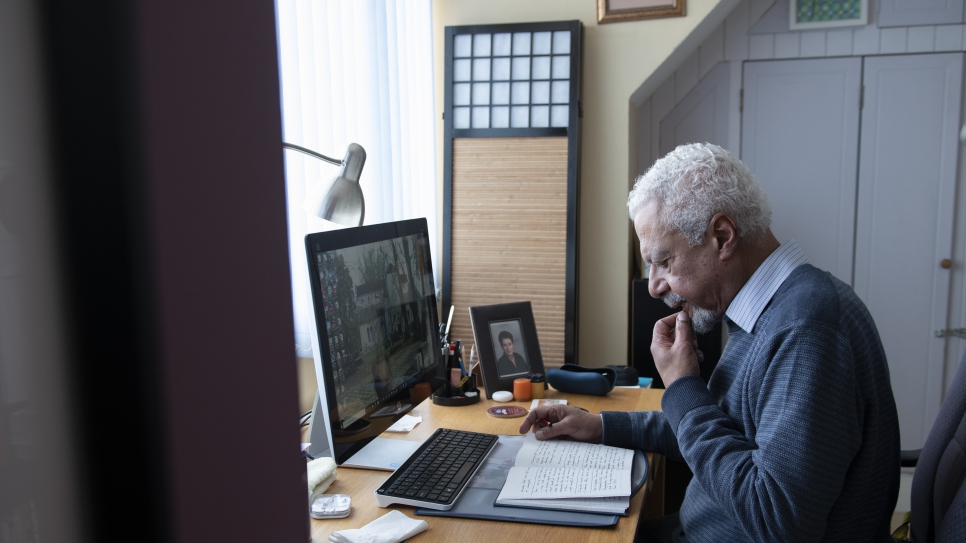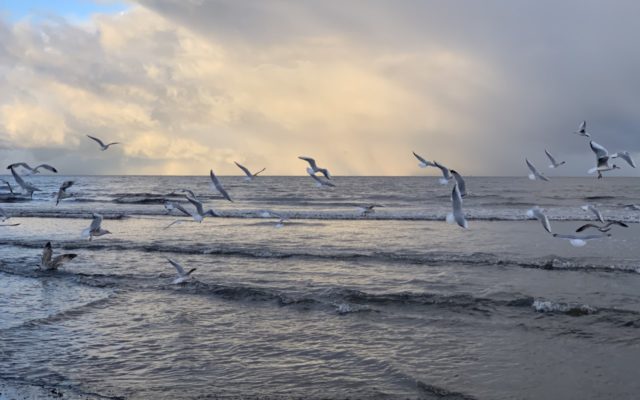The Nobel laureate who tackles themes of displacement, history and home
Abdulrazak Gurnah reflects on the isolation and hostility he had to face as a young man – and argues in favour of more humane attitudes towards refugees and asylum seekers.
29.04.2022
© UNHCR/Hannah Maule-ffinch
“You think you understand places,” says author and Nobel Prize winner Abdulrazak Gurnah, reflecting on the challenges he encountered as a teenager from Zanzibar arriving in the UK more than half a century ago.
“But really it was so different, so far away in terms of culture, social proprieties, language, religion … It was a difficult and shocking introduction. Especially for a poor stranger – and especially if you’re 18 years old.”
Seated in his “writer’s attic” – a book-filled room at the top of his house in a village just outside the historic city of Canterbury, southeast England – Gurnah told UNHCR his own story of displacement and dislocation, starting with how and why he left his native Zanzibar in 1968.
Four years after a revolution in which the Sultan and his government were overthrown, violence on the island was still widespread. “It was a period of terror – not necessarily personal terror, but the atmosphere was terrifying,” he says.
“I went to do something with my life.”
“A number of people were killed, people were in prison, various people were expelled. People lost their livelihoods, businesses were expropriated, and so forth.”
Yet he only resolved to leave after the new regime closed the schools. “That was for me the biggest reason for wanting to leave. I went to do something with my life.”
Today, he looks back on a distinguished academic career and a string of highly acclaimed novels, culminating last year in the Nobel Prize for Literature – awarded for his “uncompromising and compassionate penetration of the effects of colonialism and the fate of the refugee in the gulf between cultures and continents”.
Gurnah speaks and writes from experience. He recalls that adapting to life in Britain was hard, his sense of dislocation heightened by the racism – casual, overt and sometimes physical – that was common at the time.
Nevertheless, he excelled as a student before turning to academia, eventually becoming professor of English and Postcolonial Literatures at the University of Kent, a post from which he retired in 2017. Along the way, he penned novels such as Paradise, By The Sea, The Last Gift and Pilgrims Way, exploring themes of dislocation, isolation, colonialism and identity.

Gurnah says his emergence as a novelist was born from a desire “to make something … as opposed to just writing things down.” © UNHCR/Hannah Maule-ffinch
Yet it was only with the Nobel Prize award that he shot to literary stardom. Like many people answering that initial phone call, at first he didn’t believe it. He went to check online, imagining that whoever the prankster was would soon be “roaring their heads off and saying, ‘hey, you fell for it!’”
Gurnah says his love of writing goes back to his schooldays, but he never intended to turn it into a career. “When I did start to write, it was more about reflecting on the situation that I was in, being here in England … because writing sometimes … helps with this kind of unravelling or disentangling things.”
At the same time, he also found pleasure in writing and came to realize he might have a talent for it, which ultimately turned into a desire “to make something … as opposed to just writing things down. And once you get hooked on that, then you’re hooked.”
In his recent Nobel lecture, Gurnah said distancing himself from events in Zanzibar had led him to “dwell on the ugliness of what we were capable of inflicting on each other,” as well as the everyday harm caused by social, gender and other inequalities. Such reflections are, he suspects, “one of the burdens of people who have fled from a trauma and find themselves living safely, away from those left behind.”
“More humane attitudes are possible”
Writing – and now, fame – have given Gurnah a platform to speak out on behalf of refugees.
“I can’t tell anyone what to do,” he insists. But he can keep pointing to the injustice and inhumanity that displaced people face, and “to keep saying that more is possible, more humane attitudes are possible” than the hostility that some politicians wear as a badge.
“We see endless stories of success by people who’ve been given the opportunity. Not only as footballers, of course, but also as businessmen and businesswomen, as students who then become doctors.” (Not to mention senior politicians, he adds.) “There are endless examples of how [displaced] people bring benefits to the society that admits them – not only to themselves, but society as well.”
In previous interviews, Gurnah has criticized official attitudes towards refugees and migrants in wealthy European countries such as the UK, which on 27 April approved legislation that seeks to deter people from seeking asylum in the country. So where does the antipathy towards refugees come from?
- See also: News comment: UNHCR’s Grandi fears UK legislation will dramatically weaken refugee protection
“Well, it’s not all around the world. There are places where the hostility is at least diminished by a majority sense of ‘we must do what we can’. It seems to me that it is mostly rich countries that are hostile and defensive and afraid. And that’s a surprise, because if you think about European history, it’s only 50 or 60 years ago when refugees were going back and forth across the European continent for one reason or another.”
Gurnah also brings a writer’s meticulous attention to the language of displacement. The word “refugee”, he says, should maintain its specific meaning – and despite the circumstances in which he left Zanzibar, he does not consider himself a refugee.
“If you’re a refugee, you’re deeply unfortunate. It’s not because you desire it … it’s to do with trying to save your life and possibly your family’s lives as well.”
Gurnah said the words “refugee” and “exile” carry an essential nobility and applying them loosely to everyone on the move risks losing the context in which individuals left their homes, as well as making it harder to identify those in most need of assistance.
So after such a long time living in England, and it would be hard to find a more English setting than Kent which is also known as “the garden of England,” where does Gurnah feel most at home?
“Home doesn’t only refer to where you live,” he says. “It’s also where you feel imaginatively comfortable. Do I feel I’m a Zanzibari? Completely. But I’ve also lived in in Britain for 50 years now. In my imagination, I occupy both places but in different ways. And I would refuse to be denied either.”
—
Quotes from his novels:
“For millions of people, she could hear him say with that tremulous intensity of his, moving is a moment of ruin and failure, a defeat that is no longer avoidable, a desperate flight, going from bad to worse, from home to homelessness, from citizen to refugee, from living a tolerable or even contented life to vile horror.”
– The Last Gift, 2011
“I am a refugee, an asylum-seeker. These are not simple words, even if habit of hearing them makes them seem so. I arrived at Gatwick Airport in the late afternoon of 23 November last year. It is a familiar minor climax in our stories, leaving what we know and arriving in strange places, carrying little bits of jumbled luggage and suppressing secret and garbled ambitions.”
– By The Sea, 2001
—
To read the latest statement on the Nationality and Borders Bill by UN High Commissioner for Refugees Filippo Grandi please visit our website.




